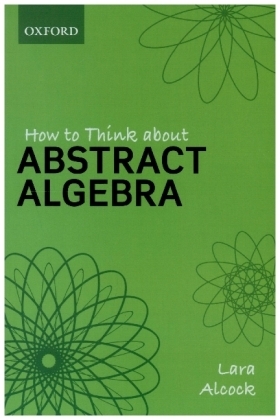
How to Think About Abstract Algebra - Lara Alcock: Winner of the 2021 IMA John Blake University Teaching Medal
| Verlag | Oxford University Press |
| Auflage | 2021 |
| Seiten | 320 |
| Format | 12,7 x 1,7 x 19,5 cm |
| Print PDF | |
| Gewicht | 372 g |
| Artikeltyp | Englisches Buch |
| EAN | 9780198843382 |
| Bestell-Nr | 19884338EA |
How to Think about Abstract Algebra provides an engaging and readable introduction to its subject, which encompasses group theory and ring theory.
How to Think about Abstract Algebra provides an engaging and readable introduction to its subject, which encompasses group theory and ring theory. Abstract Algebra is central in most undergraduate mathematics degrees, and it captures regularities that appear across diverse mathematical structures - many people find it beautiful for this reason. But its abstraction can make its central ideas hard to grasp, and even the best students might find that they can follow some of the reasoning without really understanding what it is all about.
This book aims to solve that problem. It is not like other Abstract Algebra texts and is not a textbook containing standard content. Rather, it is designed to be read before starting an Abstract Algebra course, or as a companion text once a course has begun. It builds up key information on five topics: binary operations, groups, quotient groups, isomorphisms and homomorphisms, and rings. It provides numerous examples, tables and diagrams, and its explanations are informed by research in mathematics education.
The book also provides study advice focused on the skills that students need in order to learn successfully in their own Abstract Algebra courses. It explains how to interact productively with axioms, definitions, theorems and proofs, and how research in psychology should inform our beliefs about effective learning.
Inhaltsverzeichnis:
1: What is Abstract Algebra?
2: Axioms and Denitions
3: Theorems and Proofs
4: Studying Abstract Algebra
5: Binary Operations
6: Groups and Subgroups
7: Quotient Groups
8: Isomorphisms and Homomorphisms
9: Rings
References
Rezension:
I'd very strongly recommend it to undergraduates studying maths, Sixth formers about to study maths, and anyone who did a maths degree a while ago and wants to revisit groups, rings and fields. I also recommend that any first year pure maths lecturers reading this should add this book to their course's reading list. Chalkdust
